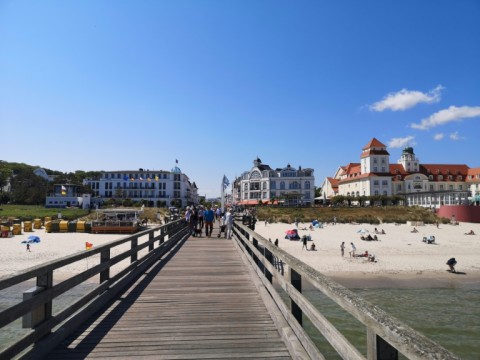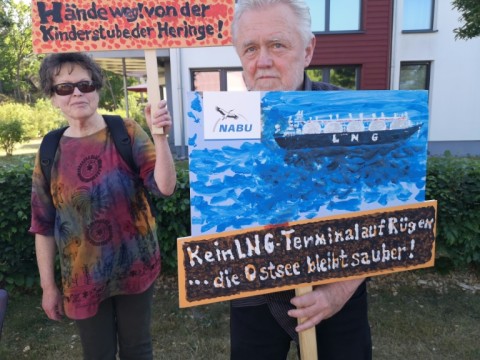
OSTSEEBAD BINZ - Melanie Schmid grows walnuts and keeps sheep at her organic farm by the cliff's edge above the port of Mukran on the German island of Ruegen in the Baltic Sea.
The view across the bay to the resort town of Binz brought her here, but Germany's plan to park two ships at the port for the import of liquefied natural gas may drive her away from the popular beauty spot.
To replace lost Russian supplies, the German government has been frantically installing LNG terminals along its coast. Over the last months, Berlin has inaugurated several with fanfare, and is planning for Mukran to be the next.
Berlin sees the new terminal as insurance against the risk of a potential gas shortage but residents remain unconvinced.
Due to the thrum of machines turning LNG back into gas, 59-year-old Schmid says she fears she "simply won't be able to sleep here anymore".
Noise pollution is however only one concern for the organic farmer, who has joined a campaign to stop the project that brings together environmental groups and local politicians worried about the effect on the destination's health and prosperity.
"Are there not other locations on the Baltic coast or the North Sea that would have less of an impact on nature, on people, on tourism as the island of Ruegen?" Binz mayor Karsten Schneider tells AFP.
The controversial pipeline, which would have relayed gas from Russia to Germany, was mysteriously sabotaged last year before it was ever put into use.

To placate residents, Economy Minister Robert Habeck travelled to Ruegen in May for discussions, following which he agreed to almost halve the capacity of the terminal at the site.
A swift decision must be made on the site if LNG is to arrive via Ruegen in the winter, he wrote in a letter in May to the region's economy minister following the visit.
But after Germany steered clear of its worst-case shortage scenario earlier this year, locals are questioning whether the Mukran installation is really necessary.
"It really looks like we will get through the next winter without any big problems," says Binz mayor Schneider.
Unmoved by the government's arguments, resistance continues to build up. Residents have petitioned parliament, while the local government has filed an injunction against the terminal's accelerated planning approval.
Arguments for surplus capacity are "incomprehensible and not at all acceptable", says Thomas Kunstmann, 64, one of the organisers behind the local campaign group "Liveable Ruegen".
Opponents of the planned terminal are concerned about the environmental impact of building new gas infrastructure.
Concerns for nature abound, too. A new pipeline around the island could likewise disrupt wildlife, running straight through spawning grounds for herring.
The area's natural bounty is why Binz attracts so many tourists. Increased shipping traffic and noise disruption "doesn't fit with the reasons why people come here on holiday", says the resort's tourism director Kai Gardeja.

